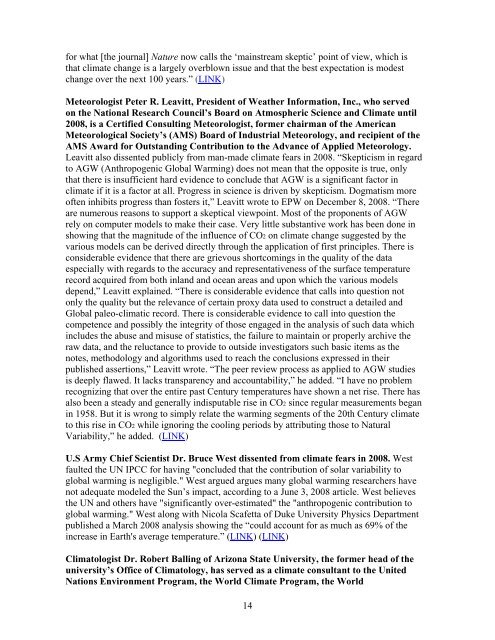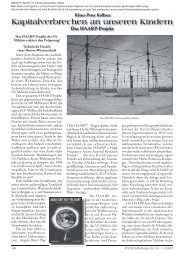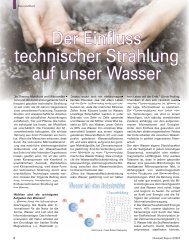U. S. Senate Minority Report: - Klimaforschung
U. S. Senate Minority Report: - Klimaforschung
U. S. Senate Minority Report: - Klimaforschung
Create successful ePaper yourself
Turn your PDF publications into a flip-book with our unique Google optimized e-Paper software.
for what [the journal] Nature now calls the ‘mainstream skeptic’ point of view, which is<br />
that climate change is a largely overblown issue and that the best expectation is modest<br />
change over the next 100 years.” (LINK)<br />
Meteorologist Peter R. Leavitt, President of Weather Information, Inc., who served<br />
on the National Research Council’s Board on Atmospheric Science and Climate until<br />
2008, is a Certified Consulting Meteorologist, former chairman of the American<br />
Meteorological Society’s (AMS) Board of Industrial Meteorology, and recipient of the<br />
AMS Award for Outstanding Contribution to the Advance of Applied Meteorology.<br />
Leavitt also dissented publicly from man-made climate fears in 2008. “Skepticism in regard<br />
to AGW (Anthropogenic Global Warming) does not mean that the opposite is true, only<br />
that there is insufficient hard evidence to conclude that AGW is a significant factor in<br />
climate if it is a factor at all. Progress in science is driven by skepticism. Dogmatism more<br />
often inhibits progress than fosters it,” Leavitt wrote to EPW on December 8, 2008. “There<br />
are numerous reasons to support a skeptical viewpoint. Most of the proponents of AGW<br />
rely on computer models to make their case. Very little substantive work has been done in<br />
showing that the magnitude of the influence of CO2 on climate change suggested by the<br />
various models can be derived directly through the application of first principles. There is<br />
considerable evidence that there are grievous shortcomings in the quality of the data<br />
especially with regards to the accuracy and representativeness of the surface temperature<br />
record acquired from both inland and ocean areas and upon which the various models<br />
depend,” Leavitt explained. “There is considerable evidence that calls into question not<br />
only the quality but the relevance of certain proxy data used to construct a detailed and<br />
Global paleo-climatic record. There is considerable evidence to call into question the<br />
competence and possibly the integrity of those engaged in the analysis of such data which<br />
includes the abuse and misuse of statistics, the failure to maintain or properly archive the<br />
raw data, and the reluctance to provide to outside investigators such basic items as the<br />
notes, methodology and algorithms used to reach the conclusions expressed in their<br />
published assertions,” Leavitt wrote. “The peer review process as applied to AGW studies<br />
is deeply flawed. It lacks transparency and accountability,” he added. “I have no problem<br />
recognizing that over the entire past Century temperatures have shown a net rise. There has<br />
also been a steady and generally indisputable rise in CO2 since regular measurements began<br />
in 1958. But it is wrong to simply relate the warming segments of the 20th Century climate<br />
to this rise in CO2 while ignoring the cooling periods by attributing those to Natural<br />
Variability,” he added. (LINK)<br />
U.S Army Chief Scientist Dr. Bruce West dissented from climate fears in 2008. West<br />
faulted the UN IPCC for having "concluded that the contribution of solar variability to<br />
global warming is negligible." West argued argues many global warming researchers have<br />
not adequate modeled the Sun’s impact, according to a June 3, 2008 article. West believes<br />
the UN and others have "significantly over-estimated" the "anthropogenic contribution to<br />
global warming." West along with Nicola Scafetta of Duke University Physics Department<br />
published a March 2008 analysis showing the “could account for as much as 69% of the<br />
increase in Earth's average temperature.” (LINK) (LINK)<br />
Climatologist Dr. Robert Balling of Arizona State University, the former head of the<br />
university’s Office of Climatology, has served as a climate consultant to the United<br />
Nations Environment Program, the World Climate Program, the World<br />
14





